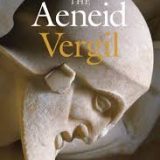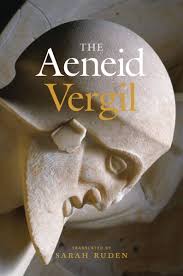The Aeneid – Virgil – 29-19 B.C.
Reviewed by: Michael Sympson Date: 15 September 2001
 Dryden’s labor of love, part I.
Dryden’s labor of love, part I.
I have a profound respect for John Dryden (1631-1700). In Elysium I see him presiding over all his English peers, including – shall I dare the blasphemy? – even Shakespeare. These days barely anyone cares to remember Dryden’s numerous plays, poems and satirical epics. Scholars still read his essays and sometimes his adaptations of Chaucer. The loss is entirely ours. But whenever an English speaking reader opens Plutarch, Ovid, or Theocritus he may have a translation of Dryden in his hand. However Dryden’s labor of love was Virgil. I own an edition of the Aeneid which gives Dryden’s translation with his own introductory essay. After the fall of Cromwell, it is the most powerful confession of republican spirit wrapped in a very erudite exegesis and intelligent political analysis, I have ever read.
Virgil with more justification than any Greek, could be called the father of Western Literature. His work has set a benchmark for excellence. Dante referred to Virgil as his “master,” Dryden hailed Virgil as the perfect poet. Virgil’s poetry communicates across the cultural barrier from a period which had made a science of oratory and banked its entire stock in learning and political persuasion on the fine art of oral delivery. I feel it still has an edge over our snazzy sound bites designed to titillate the 30 second attention span of hypnotized telly-junkies. Sustained arguments don’t ambush you on your solar plexus.
Virgil was an extremely shy person, afflicted by tuberculosis, a sly smirk under a peasant’s heavy brow; he spoke with a rustic accent. Modern critics sometimes express disdain for passages in his work that make him look like a servile courtier. But the Aeneid’s eulogies on the Imperial regime never exceed the noncommittal deference of a peasant, who gives Caesar Octavian what is Caesar’s, in order to be left unmolested, when he minds his own business. Besides from early on, Virgil had been personally indebted to the former Triumvir for his intervention in the eviction procedures of Virgil’s paternal estate. It did not really help in the end, but put the poet under obligation all the same. There are indications that after the upheavals in 23 BC. which had led to the downfall of Mæcenas, Virgil’s patron and friend, the poet felt increasingly under pressure. It speaks for enormous talent that his best work was written on commission and not merely a product of gratuitous choice, Virgil would accepted limitations and expanded his talent from within proscribed boundaries.
Dryden’s most difficult task as a translator was not just to be faithful to the original, but to ferry Virgil’s Aeneid across the cultural divide. There was little appreciation for the polish and subtlety of Virgil’s style, and Dryden wouldn’t lose his sleep over a piece of unashamed padding. There is a difference of temperament between the 2 great poets which could have ruined the translation. It didn’t. “Meantime imperial Neptune heard the sound / Of raging billows breaking on the ground. / Displeas’d, and fearing for his wat’ry reign, / He rear’d his awful head above the main, // (and now the truly majestic touch:) // Serene in majesty; then roll’d his eyes / Around the space of earth, and seas, and skies.” One almost regrets that Virgil hadn’t thought of it. He only wrote :“Interea magno misceri murmure pontum, / emissamque hiemem sensit Neptunus, et imis / stagna refusa vadis, graviter commotus; et alto / prospiciens, summa placidum caput extulit unda.” (“meantime great noise disturbed the sea, tossed forth a storm, stirred Neptune on the lowest floor, who, displacing waters of the deep, calmly raised his head above the highest wave”) which creates a powerful enough image, though not quite of Dryden’s grandeur.
Dryden’s most difficult task as a translator was not just to be faithful to the original, but to ferry Virgil’s Aeneid across the cultural divide. There was little appreciation for the polish and subtlety of Virgil’s style, and Dryden wouldn’t lose his sleep over a piece of unashamed padding. There is a difference of temperament between the 2 great poets which could have ruined the translation. It didn’t. “Meantime imperial Neptune heard the sound / Of raging billows breaking on the ground. / Displeas’d, and fearing for his wat’ry reign, / He rear’d his awful head above the main, // (and now the truly majestic touch:) // Serene in majesty; then roll’d his eyes / Around the space of earth, and seas, and skies.” One almost regrets that Virgil hadn’t thought of it. He only wrote :“Interea magno misceri murmure pontum, / emissamque hiemem sensit Neptunus, et imis / stagna refusa vadis, graviter commotus; et alto / prospiciens, summa placidum caput extulit unda.” (“meantime great noise disturbed the sea, tossed forth a storm, stirred Neptune on the lowest floor, who, displacing waters of the deep, calmly raised his head above the highest wave”) which creates a powerful enough image, though not quite of Dryden’s grandeur.
 But for his padding, Dryden more than compensates with his absolutely ingenious use of transpositions. Look how Virgil puts his thoughts in sequence: “There was an ancient city, inhabited by Tyrian husbandmen, Carthage, that faces from afar Ostia at the Tiber’s mouth, of great wealth and most warlike in its enterprise and being dear, it’s said, more than all the land to Juno, who even Samos held in less esteem. Here they kept her arms, here her chariot, and the goddess hatched designs and hopes for a capital of nations, should destiny permit. Yet surely she had heard that a race of Trojan issue was hereafter to overturn the Tyrian towers, a people born to rule and of warlike pride would lay waste her Lybia, according to destinies decree.” And now compare how Dryden inverted this sequence to squeeze into his rhyming couplets the same amount of information and even throw in an additional explanatory note: “Against the Tiber’s mouth, but far away, / An ancient town was seated on the sea; / A Tyrian colony; the people made / Stout for the war, and studious of their trade: / Carthage the name; belov’d by Juno more / Than her own Argos, or the Samian shore. / Here stood her chariot; here, if Heav’n were kind, / The seat of awful empire she design’d. / Yet she had heard an ancient rumor fly, / (Long cited by the people of the sky,) / That times to come should see the Trojan race / Her Carthage ruin, and her tow’rs deface; / Nor thus confin’d, the yoke of sov’reign sway / Should on the necks of all the nations lay.” This is a piece of sure-footed vigor and a rousing good read, but misses on Virgil’s slightly subdued and more reflective consideration of circumstances.
But for his padding, Dryden more than compensates with his absolutely ingenious use of transpositions. Look how Virgil puts his thoughts in sequence: “There was an ancient city, inhabited by Tyrian husbandmen, Carthage, that faces from afar Ostia at the Tiber’s mouth, of great wealth and most warlike in its enterprise and being dear, it’s said, more than all the land to Juno, who even Samos held in less esteem. Here they kept her arms, here her chariot, and the goddess hatched designs and hopes for a capital of nations, should destiny permit. Yet surely she had heard that a race of Trojan issue was hereafter to overturn the Tyrian towers, a people born to rule and of warlike pride would lay waste her Lybia, according to destinies decree.” And now compare how Dryden inverted this sequence to squeeze into his rhyming couplets the same amount of information and even throw in an additional explanatory note: “Against the Tiber’s mouth, but far away, / An ancient town was seated on the sea; / A Tyrian colony; the people made / Stout for the war, and studious of their trade: / Carthage the name; belov’d by Juno more / Than her own Argos, or the Samian shore. / Here stood her chariot; here, if Heav’n were kind, / The seat of awful empire she design’d. / Yet she had heard an ancient rumor fly, / (Long cited by the people of the sky,) / That times to come should see the Trojan race / Her Carthage ruin, and her tow’rs deface; / Nor thus confin’d, the yoke of sov’reign sway / Should on the necks of all the nations lay.” This is a piece of sure-footed vigor and a rousing good read, but misses on Virgil’s slightly subdued and more reflective consideration of circumstances.
Virgil’s Aeneid is a great work of art. Neither Humphries’ nor Mandelbaum’s and especially not Fitzgerald’s translation do it justice. Dryden’s translation of Virgil’s ‘Georgics’ has added to our language one of its great revelations. Dryden’s rendition of the Aeneid has its dry spells, but it still is a cut above the mob of modern translations.















